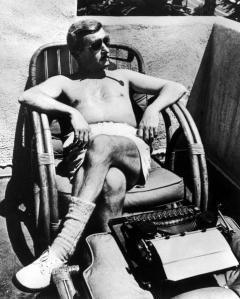Martin Lake's Blog, page 8
November 26, 2013
When Inspiration Needs a Nudge
I’ve written earlier about what I consider to be the seven stages of writing:
Inspiration
Incubation
Perspiration
Evaluation
Extermination
Resurrection
Projection
There are links to this post and one about inspiration at the end of this post but today I’m going to focus on some practical suggestions regarding inspiration.
Every writer knows that time when the wells of inspiration seem to have dried up. It’s not writer’s block but it has the same effect. Your creative path peters out and you are left feeling there’s no way forward. 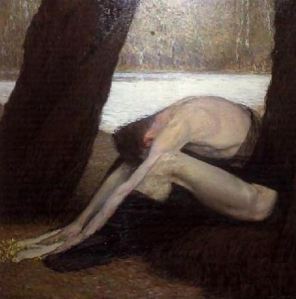
This post is about some ways I’ve found to help nudge inspiration when it’s gone off down the road for a cup of tea, perhaps in a huff at being overworked. Come back inspiration, all is forgiven.
I once read some research which found that when people who were considered creative were analysed, poked and prodded the one overall cause of their creativity was found to be this: That they considered themselves to be creative. They had experienced creativity in the past and they assumed that they would continue to be creative in the future. I’ve no idea where this research came from nor whether it is valid but I like the idea as it’s one which encourages writers whose inspiration is floundering to pick ourselves up and carry on.
Here are some things which work for me.
Find somewhere to be inspired. Think of the places where you’ve been inspired before and go back to them. It might be some bucolic place, (remember how Wordsworth got inspired gazing at Tintern Abbey) but it might equally be in the hustle and bustle of a big city. I get most of my good ideas when I’m sitting in a café. I’ve no idea why. It may be something to do with being away from my normal writing environment, it may be to do with the sense of anonymity, it may be the opportunities the place gives me to be a silent observer. Wherever you go, please remember to take a notebook with you. A notebook is one of the essential tools of creativity; the best place to capture those inspirational thoughts which are as ephemeral as clouds.
Putting on Heads. Win Wenger Phd is an unusual thinker. ‘The Einstein Factor’ a book he wrote with Richard Poe gives lots of great ideas and his web-site gives more. http://www.winwenger.com/wenger.htm
Inevitably you may find some of Wenger’s ideas great, others weird, others unworkable. Here’s one I particularly like called Putting on Heads. The basic idea is that you put on the head of a genius or mentor and try to experience the world with her or his senses and think about these experiences with their minds. Check out the book for more information on how to do it.
I used to travel a lot to do training and once I left my home in the West Country of England to go to London. I was in a terrible hurry so imagine my consternation when I got on the train and realised that I’d left my notebook and the novel I was reading on the dining room table. How would I fill the two hour journey? I decided to try out Putting on Heads. First I became Napoleon and viewed the landscape as he might have done. I had the Old Guard lurking behind a hill, Dragoons and Lancers charging across the meadows.
But after a while I got bored and decided to put on the head of a mystery writer instead. (I recommend this for long train journeys) The woman sitting beside me slumped against my arm. As Martin Lake I would have assumed she was asleep. As Agatha Christie I assumed she’d been murdered. A man walked into the carriage and looked around as if perplexed before turning and hurrying away. Was he merely an ordinary passenger who had returned from the toilet and walked into the wrong carriage or was he Richard Hannay watching for the Police working their way through the carriage in search of him?
Try putting on heads as an aid to creativity. It really works.
The Disney Strategy. This is a term coined by Robert Dilts. When he was researching creativity a cartoonist from the Disney studios said there were three Walt Disneys: The Dreamer, the Realist and the Spoiler (or critic.) To be a dreamer you need to ignore the other two personas and adopt a playful, child-like, inquisitive posture. I use the word posture deliberately. Dilts finds that if you lean back, look up and focus your eyes on the skies rather than the ground you’re more likely to come up with ideas. Check out Robert’s web-site http://www.nlpu.com/NewDesign/NLPU.html for more information, buy his books or, better yet, go on one of his courses.
The Moving Finger.
Think of five numbers. Pick up a book, any book. Open the book at the page corresponding to the largest number. Select the paragraph which corresponds to the smallest number. Use the other numbers in this way. Let’s say they are 7, 3 and 10. Find the seventh noun in the paragraph, the third adjective and the eleventh verb. Here’s what I’ve found from the novel Fever by Mary Beth Keane.
Noun: knot, Adjective: young, Verb: cxplain. My immediate inspiration from these words is a story about how a young boy trying to explain why he’s tied a knot around his friend’s neck. Or perhaps around his own.
Martin’s Creativity Game. I’m indebted to Suzi Smith for introducing me to the idea in a different context. I’ve changed it to suit the needs of the writer. http://suzismith.net/
Here’s what to do:
Go for a walk with a notebook and note down seven things which grab your attention.
Find somewhere quiet to work (or a noisy bustling café if that suits you better.)
Write seven topic heading on one sheet:
Here are some suggestions:
Protagonist, antagonist, genre, conflict, opening scene, climax, resolution.
You may want to choose others or mix and match. It really is flexible.
Let’s assume on your walk you noticed: a flower, a snoozing dog, a child on a swing, a solitary cloud, a glove on the ground, a window which slammed shut, an abandoned bicycle.
Here’s what to do next. Ask yourselves these questions:
In what ways is your protagonist like or unlike a flower?
In what ways is your antagonist like or unlike a snoozing dog?
In what ways is your stories’ genre like or unlike a child on a swing.
And so on.
Then step back and read what you’ve come up with. Is there a story lurking here? If not can you see if changing the linkage of objects to topics produces a better result.
What are your suggestions for nudging inspiration? Please leave a comment with your ideas and I’ll collect them together for a future post.
Related articles
http://martinlakewriting.wordpress.com/2013/10/01/seven-stages-of-writing/
http://martinlakewriting.wordpress.com/2013/10/18/inspiration/
Don’t Stop: 6 Tricks for Beating Creative Blocks (shutterstock.com)


November 24, 2013
An extract from my novel Outcasts. #SampleSunday #HistNov
This is an extract from my novel Outcasts. It tells what happens to the ordinary men who were knighted by Balian of Ibelin to help defend the city of Jerusalem against Saladin and his armies.
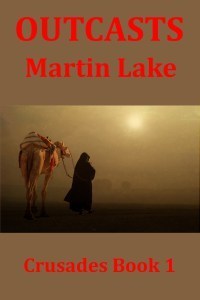 Ordinary men who were raised so swiftly into a new position would never find it easy to prosper in the hierarchical medieval world. These men, and their families, would find life difficult beyond imagination.
Ordinary men who were raised so swiftly into a new position would never find it easy to prosper in the hierarchical medieval world. These men, and their families, would find life difficult beyond imagination.
This scene is set just before Saladin arrives at the city. All is peaceful, for the moment. Two pilgrims have just arrived at an inn.
Bernard heaved a barrel of ale onto the counter.
‘Good news,’ he said. ‘The young Englishmen have decided to stay for a month.’
‘Excellent,’ Agnes answered. ‘With the soldiers gone the city feels empty and our coffers are beginning to look the same.’
‘Do you like the English?’ he asked. ‘You might be related.’
‘My great grandfather was English,’ Agnes said. ‘That was a long time ago. In any case, these two are of Norman blood. And my great grandfather was said to be the son of the Normans’ deadliest enemy.’
‘But do you like them?’
She paused before picking up a cloth and polishing a tankard. ‘I like them as much as any other guest. Why do you ask?’
‘They’ve only been here, what, three days and the boys seem to have got attached to them already.’
Agnes looked troubled. ‘Do you think it is a cause for concern?’
‘I don’t know. I think Gerard believes they will stay here forever.’
‘Gerard’s always excitable.’
Agnes came over to her husband and brushed her fingers through his hair. ‘And what about you? Do you like them?’
He grinned. ‘I do. That may be why I am asking the question. I like them a lot, more than an inn-keeper should like his guests.’
‘That is because they come from somewhere far-away and exotic. England sounds so exciting. Jerusalem is boring and you hanker for adventure.’
He grabbed her by the waist and stared into her eyes. ‘I have all the adventure I need just living with you.’
Agnes blushed at his words and a tiny smile grew upon her lips.
‘I like you saying this,’ she said. ‘But I sometimes wonder if you don’t yearn for a little more adventure than I can provide.’
‘Not in the slightest,’ he said, pulling her close.
Later that day John sat in the courtyard enjoying the last of the day’s sunshine. He closed his eyes and turned his face up to the sky, enjoying the warmth bathing his skin. His lips felt dry and hot and he licked them slowly.
He did not hear any noise but he suddenly became aware of a presence in the courtyard. His first thought was that it was one of the boys.
But then he knew. He knew it was Agnes.
He opened his eyes and turned to look at her.
She was leaning in the doorframe, a cloth and a plate in her hand. She must be enjoying the sun as well, he thought.
His heart quickened. Or perhaps she had been watching me.
‘I didn’t mean to disturb you,’ she said softly.
He shook his head.
‘You didn’t. I wasn’t asleep.’
‘You looked very peaceful.’
He thought as if the breath was being squeezed from his lungs.
‘I was just thinking, just dreaming, day-dreaming rather.’
She laughed, a little tinkling sound which almost made him shiver.
‘I do that,’ she said. ‘Or I do whenever I get a minute’s peace. I’m afraid that isn’t often.’
He gazed at her but did not answer. His mind struggled to find something to say but every phrase he formed seemed inane.
The sun had moved so that half her face was in full sunlight and half in shade. The branches of the old olive tree flickered shadows across her face. Almost like a bridal veil, he thought. His gaze was caught by the line where light and shadow met. Her features, normally so bright in his imagination, were dimmed there but more alluring for that.
‘You look red,’ she said.
He touched his hands to his cheek and blushed even redder.
‘It’s the sun,’ he said. ‘My skin isn’t used to it.’
She smiled. He had no idea what the smile meant. He guessed she may have realised that the colour on his face came from within.
‘John,’ called a familiar voice from within the inn.
He ignored Simon’s call, hoping that he would not find him and go away.
‘John,’ he called again. ‘Where are you? I’ve got something to tell you.’
Still John ignored his call.
Agnes smiled and glanced at the ground before looking up at him once again.
‘Aren’t you going to answer your cousin?’ she asked. ‘He sounds keen to find you.’
John nodded and went even redder. He cursed his cousin.
‘I’m in the courtyard,’ he called.
Simon appeared in the doorway and took in the scene. A grin which looked knowing and lascivious broke upon his face.
‘I wasn’t interrupting anything?’ he asked innocently.
Agnes shook her head.
‘Of course not,’ said John quickly. He got to his feet. ‘What did you want?’
Simon put his hand to his mouth as if struggling to remember. ‘Do you know, I’ve completely forgotten.’
He gave a courtly bow to Agnes, winked at John and went back into the inn.
Agnes turned and gazed at John.
‘I’d better go after him,’ he said.
‘I think you had,’ she answered. ‘Before he gets any more strange ideas.’
John mumbled incoherently and walked into the gloom of the inn.
Outcasts is available for $2.99 or equivalent from all ebook retailers.
Join my subscriber list for exclusive access stories, updates and advance notice of my new releases.
It’s simple to sign up….. Just click on this link: http://eepurl.com/DTnhb and it will take you to a sign up form.


November 17, 2013
Dodger Receives his Second Sentence. #SampleSunday #HistNov
The genial man who had been silently observing proceedings suddenly sat forward, cupping his chin in his hands.
‘Why were the police and magistrates in London so lenient to you, Jack?’ he asked in a soft Irish accent. ‘Do you have any idea at all?’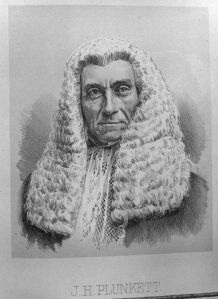
‘Lenient?’ Jack said indignantly. ‘They sent me here, didn’t they?’
‘They did indeed. But with your crimes they could have put you in jail for the rest of your days.’
‘Perhaps it’s because I was framed. It was a put-up job.’
The man chuckled to himself. ‘You’re a fighter and no mistake.’
‘What do you think, John?’ the Governor asked, turning to the man. ‘What’s your advice? As a lawyer?’
‘There’s no question of a pardon, free or conditional,’ the lawyer answered.
‘A Ticket of Leave?’
The man walked over to the desk and picked up some papers. ‘He was convicted on 31st July 1838 and given a fourteen year sentence.’ He did a quick calculation. ‘He won’t be eligible for a Ticket of Leave until 1844.’
Gipps frowned and looked at Fowler.
‘My hands are tied, Fowler, I’m sorry. The boy will serve a minimum of three more years before he’s eligible for a Ticket. He’ll have to be sent back to the barracks.’
‘No,’ Jack cried, throwing himself to the floor. ‘Anything but that, Sir Gipps. I’ll be good, I swear it.’
The Governor looked at him with distaste but appeared unmoved by this demonstration of passion.
The lawyer tapped his finger upon his chin. ‘There is another option, Sir George,’ he said.
The Governor raised an eyebrow.
‘We could simply assign him to Dr Fowler. He becomes an indentured servant.’
‘But what about the death of Stone?’
The lawyer shrugged. ‘The Bathurst constabulary were quite confident that Stone fell into the well.’
‘And the severed rope?’
‘It could have been done by the Aborigines, particularly if Dawkins is correct in saying how Stone treated the girl.’
Gipps picked another pinch of snuff. The room fell silent.
‘I can’t say I’m enamoured of the idea,’ he said, at last. ‘This boy is an out and out villain. His own record condemns him as one of the most accomplished criminals in London when he was a mere ten years old. He would prove far more of a danger to the colony now.’
‘Pooh pooh, Sir George,’ the lawyer said. ‘Are we so scared of little boys that we hide our heads beneath the bed-sheets?’
‘This is not your typical little boy.’
‘And neither is my father a typical doctor,’ Beatrice said firmly. ‘As well as a medical man he is an amateur anthropologist.’
The Governor frowned.
‘My daughter means that I study mankind,’ Fowler explained. ‘The habits of different people, their cultures and their customs. It’s why I came out to New South Wales in the first place.’
‘So father will be well able to manage such a singular case as Jack,’ Beatrice said.
Gipps sighed and turned to the lawyer. ‘Are you sure there is no alternative?’
‘None that I would recommend,’ he answered. ‘If the boy is half as skilful as his record claims no barracks will possibly hold him. And if by some miracle he does remain there, he will become more hardened to crime. No doubt, he will make a mockery of the place and lord it over the guards.’
Jack sniggered at this.
‘See, Sir George,’ the lawyer continued. ‘I’ve hit the nail on the head. It strikes me that this boy will either end up a national hero or a disgrace dangling on the end of a rope. I think that it is largely up to us to determine the outcome.’
Gipps sighed and turned towards Fowler. ‘On your own head be it, Doctor,’ he said.
Beatrice clapped her hands and beamed at Jack. Fowler smiled but a good deal less enthusiastically.
Gipps turned a fierce gaze upon Jack, so fierce that Jack recoiled and took a step backwards.
‘Jack Dawkins,’ he said. ‘You’ve been saved from a terrible life by the goodness of Dr Fowler, a kind and worthy gentleman. If I hear that you in any way abuse his trust I shall have no hesitation in seeking out the Attorney-General, Mr Plunkett here, and I shall ask him to make sure you are hanged.’
‘So be warned,’ the Attorney-General said although his voice held little threat.
‘I will, sir,’ Jack answered. ‘I’ll be good as gold.’
You can view longer samples of this book on all e-book outlets. And if you like it you can buy it for $3.00, £1.92, 2.68 Euros or equivalent in your national currency. It is also available in Australia on the new Australian Amazon site.
My subscriber list gives you advance notice of my new releases and exclusive access to free stories.
It’s simple to sign up….. Just click on this link: http://eepurl.com/DTnhb and it will take you to a sign up form.
Related articles
Deciding the Dodger’s fate. #SampleSunday #HistNov (martinlakewriting.wordpress.com)
Dodger and the Transportation Ship. #SampleSunday #HistNov (martinlakewriting.wordpress.com)


November 9, 2013
Deciding the Dodger’s fate. #SampleSunday #HistNov
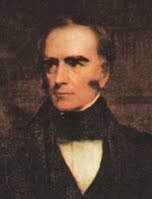 Governor Gipps was a slim, dark-looking man with thick dark eye-brows underneath a receding fore-head. This made him look as though he possessed a brain larger than the norm. He leaned back in his chair and scrutinised Jack. His gaze was a mixture of the far-away and the penetrating, as if he were a poet who had been brought a choice piece of fruit and was contemplating whether it would be best to eat it or compose an ode in its honour.
Governor Gipps was a slim, dark-looking man with thick dark eye-brows underneath a receding fore-head. This made him look as though he possessed a brain larger than the norm. He leaned back in his chair and scrutinised Jack. His gaze was a mixture of the far-away and the penetrating, as if he were a poet who had been brought a choice piece of fruit and was contemplating whether it would be best to eat it or compose an ode in its honour.
Jack squirmed beneath the gaze. He could sense danger better than most and Gipps exuded danger with a silky intensity.
At that moment a door to the side of the office opened and a genial looking man walked in. He plucked up a chair and leant it against the wall, as if he were a member of an audience who had come late to the performance of a play and did not wish to draw attention to himself.
Dr Fowler bowed his head to him but the Governor gave no sign of recognition.
‘I’ve read the paper-work,’ Gipps said to Fowler. ‘It seems accurate enough. Stone, the boy’s master, was found dead in his own well. The Bathurst police believe that Stone toppled into the well when he was drunk, a not unusual state for him.’
He paused and took a sniff of snuff before continuing. ‘But they were unable to account for the fact that the rope in the well had been severed.’
He glanced at Jack; his eyes brimming with accusation.
‘I didn’t do nothing,’ Jack said.
‘Be quiet, boy,’ Fowler said quickly. ‘Speak when you’re spoken to, and only then.’
Gipps noticed the intervention. He clasped his hands together and leaned back in his seat.
The silence in the room grew heavy. Jack’s mind raced, trying out an array of explanations and falsehoods, measuring them against the Governor’s stare to see which stood the best chance of satisfying him.
‘Nobody accused you of anything, Dawkins,’ the Governor said. ‘Yet you were quick to deny any wrong-doing. This makes me suspicious. It may be that you will have to stand trial for Stone’s murder.’
‘I didn’t kill him,’ cried Jack.
‘Speak when you’re spoken to,’ said Gipps in a voice more harsh than any he had used hitherto.
He turned his attention to Fowler. ‘Do you know anything of the history of this boy?’ he asked.
‘A little, Sir George. Only what Surgeon Wills told me.’
Gipps held up a sheet of paper and shook his head as if weary.
‘He may be a boy,’ he said, ‘but Dawkins is one of the most seasoned criminals in the Empire. He was the principal associate of an old Jew who was responsible for a vast amount of crime. According to the police Dawkins was the most accomplished pick-pocket in the capital. His sobriquet was the Artful Dodger.’
Jack sat up, beaming with pride. Gipps’ eyes caught those of Fowler, compelling him to turn to gaze upon the boy.
‘Do you see the vain look upon Dawkins’ face, Fowler?’ Gipps asked. ‘He is actually proud of his criminality. Is this the sort of boy you wish to have roaming the streets of Sydney? More to the point, is this the sort of boy you wish to have running around your own home?’
‘He’s not a bad boy,’ said Beatrice. ‘He’s just had a bad life.’
‘I applaud your gentle thoughts, Miss Beatrice,’ Gipps said. ‘But matters such as this must be decided by head and not by heart.’
‘He is, I agree, like a savage,’ Fowler said. ‘In some ways he is very like the savages who roam the interior of the continent. Theirs is a savagery born of ignorance and a hard, cruel life. I believe that the same holds true for Jack Dawkins.
‘Sir George, Dawkins was born of an illicit liaison between a doctor and his scullery-maid. When the mother died he was left in the care of a young girl, little more than a child herself. In order to support her young charge she took to a life of crime and prostitution. He ended up in the nest of vipers presided over by the Jew. It was none of Jack’s doing.’
‘And who told you this tale, Dr Fowler, if I may so enquire?’
‘Jack told me himself.’
Gipps smiled. ‘Dr Fowler, you see many people who are ill in the course of your practice. I am sure that you also see many people who claim they are ill but who are not. I would assume that sometimes it is difficult to sift the honest from the false.’
Fowler did not answer. After a moment he nodded in agreement.
‘My contention is that this boy is a hardened criminal,’ the Governor continued. ‘It matters not whether he is a victim of circumstances or a willing embracer of crime. The only fact that matters is that he is a criminal. Not just a casual one but one who defeated the police of London for year upon year.
‘I have no doubt, Fowler, that Dawkins will take the first opportunity to rob you and your household of everything. And if my suspicions about the death of Stone are correct, then theft may be the least you fear.’
‘That’s not true, Sir Gipps,’ Jack cried. ‘Dr Fowler and his folk have treated me most handsome and I wouldn’t harm then for anything.
‘And as for Stone, he was an out and out villain who beat poor old Mother and raped Charlotte the Aborigine girl. I didn’t kill him but I’m not sorry he’s dead. In fact, I’d spit on his corpse if it were spread out on your table.’
Gipps stared at him in astonishment.
‘Artful is available from all good e-book retailers for $2.95 or equivalent local price. You can check out a longer sample for free before you buy.
Related articles
Dodger and the Transportation Ship. #SampleSunday #HistNov (martinlakewriting.wordpress.com)


November 3, 2013
Dodger and the Transportation Ship. #SampleSunday #HistNov
This is a sample from my novel ‘Artful’. It is available as an e-book from all good retailers.

Detail of an original George Cruikshank engraving showing the Artful Dodger introducing Oliver to Fagin. (Photo credit: Wikipedia)
After being convicted of the theft of a snuff-box the prince of pick-pockets is sentenced to transportation to New South Wales.
As the line of convicts shuffled down the road towards the river they saw long masts rearing from the decks of countless ships berthed against the banks of the Thames.
‘The Transportation Fleet,’ said an old man beside Dodger.
‘We’re not going on them, are we?’ he asked, his eyes widening. ‘Them hulks, all round the world?’
‘That’s the plan, son.’
‘Well it’s a blooming nonsensical plan if you ask me. I doubt any of ‘em would cross to Southwark without sinking.
‘Shut up,’ called one of the guards.
In surly, grumbling silence, the convicts trudged up the gangway of the first ship. As he neared the deck Dodger saw three rats bolt down the plank towards land.
The man behind him sucked in air in a loud, horrified gasp. ‘They know it’s cursed,’ he cried.
‘Not half as much as you are,’ cried one of the sailors, making his friends laugh at the jest.
The ship that Jack had been assigned to was called ‘The Hornet.’ It was already ancient when it had been pressed into service to supply the fleet at Trafalgar. Before that, or so it was rumoured, it had been a slave ship running from Bristol to Africa and the West Indies. As the men were shoved below decks to the damp and fetid hold awaiting them they could well believe these rumours to be true.
One elderly man who had spent his years tramping the highways became wild-eyed with terror at the sight of the pent up, noisome gloom and began a fearsome howl of distress which only ended when two guards knocked him unconscious.
‘The bastards,’ said Dodger but not so loud that they could hear him.
‘Let’s hope they’ve killed him,’ said a huge man with a sprawling, knotted beard. ‘It’ll mean more grub for us.’
Crimp pushed his way into the large man’s shadow. ‘Don’t believe it, Trench,’ he said. ‘They’ll eat his grub themselves or sell it to us, what’s starving.’
‘Shut yer mouth, Crimp,’ said the bearded man. ‘I’m sick of the sound of yer already.’
Crimp laughed but it was a laugh devoid of humour. He turned his eyes towards Dodger. ‘What you looking at?’ he growled.
‘Nothing, honest.’
Crimp grabbed him by the throat. ‘Well see you don’t look at me in future. Not unless I tells yer to. It’s me who will do the looking, and the catching.’
‘Leave him be,’ said the big curly haired man who had been watching Jack and Crimp before they boarded. ‘He’s only a boy.’
‘I can guess yer interest, so I can,’ Crimp sneered at him.
The man did not answer but gave a quick glance towards the guards. They were looking elsewhere. He took a step towards Crimp and seized him by the hair. He twisted it violently, causing the little man’s back to arch over, exposing a scrawny throat. The big man ran his fingers slowly from one side of the throat to the other.
‘See here, boy,’ the big man said to Jack, turning Crimp as though he were a doll. ‘This neck is little stronger than a rabbit’s.’
He jabbed his finger at Crimp’s gulping Adam’s Apple making him squeal. ‘One chop from me and it’s his grub we’ll be eating.’
Crimp waved his gloved hand ineffectually in the air while his left tried vainly to unloose the big man’s hold.
‘Enough,’ said Trench. He squared up to the big man and gave a belligerent stare. ‘What’s your name, friend?’
The man released his hold upon Crimp’s hair and sized Trench up and down. ‘Beresford,’ he answered. ‘Want to make something of it?’
Trench shook his head. ‘No. Not this time. But just remember one thing.’ He pointed to the skinny one-eyed man. ‘I can hit Fred Crimp, I can punish him, but you can’t.’
Beresford stared at Trench for a moment. ‘Fair enough,’ he said. ‘And the same goes for the boy. I can punish him, but neither you or your creature touch him.’
Trench nodded. ‘It’s a bargain.’ He stalked off, Crimp running after him.
Jack grinned up at his protector. ‘Thanks very much, mister. My name’s Jack Dawkins.’
The man gave a slow smile. ‘Mine’s Beresford.’
‘Just Beresford? Ain’t you got a first name?’
‘If I ever had, I’ve forgotten it.’
Jack nodded sagely. ‘I think Beresford is right enough for you.’
The big man grinned and ruffled Jack’s hair.
*************
Artful is available for $3.00 or equivalent from all good retailers.
My subscriber list gives you advance notice of my new releases and exclusive access to free stories.
It’s simple to sign up….. Just click on this link: http://eepurl.com/DTnhb and it will take you to a sign up form.
November 1, 2013
Publishing Is Easy
This is a post from the wise and down-to-earth David Gaughran. He’s a great man to follow with timely, useful blog posts.
His books are an essential for any Indie writer or those thinking of going down the Indie route.
And he hasn’t paid me to say this!


October 31, 2013
Talking with authors
I’ve had the pleasure of talking with a number of great authors over the past year. If you’re interested in the art and craft of writing it’s really worth taking a look. You can find the talks by searching for author names using the little Sherlock Holmes magnifying glass on the top right of the blog or by clicking on ‘author interviews’ at the end of this
post.
Most of my talks, though not all, have been with historical novelists. They include Ben Kane, Elizabeth Chadwick, Manda Scott, Colin Falconer, David Gaughran, Justin Hill, Angus Donald, Douglas Jackson, Giles Kristian, Gordon Doherty, Harvey Black, James Aitchieson, James Wilde, Lynn Shepherd, N. Gemini Sasson, Carol McGrath, Paul Dorset, Prue Batten, Robyn Young, Simon Toyne, SJA Turney and Ty Johnston.
You can find interviews of me on the blogs of Gordon Doherty, Ty Johnston and Paul Dorset.


October 30, 2013
Sign up to my newsletter subscription list.
I’ve just sent the first of my exclusive offers to subscribers of my list. It’s a short story based on a place which was very important to me as a child.
I’m planning on offering more stories to my subscribers as well as news on my forthcoming books. Why not be one of them? Signing up is easy and I promise I won’t bombard you with emails or send your details to other people.
I manage my list through Mailchimp, one of the most experienced providers of these services. it has a cute logo as well. 
My subscriber list gives you advance notice of my new releases and exclusive access to free stories.
It’s simple to sign up….. Just right click on this link: http://eepurl.com/DTnhb and it will take you to a sign up form.
Alternatively, email me on martinlake dot 14 at gmail dot com and I’ll email you back with a link to sign up.


October 26, 2013
‘Trade Winds to Meluhha’ Vasant Davé
A while ago I got a message from Vasant Davé, a writer in Bombay, offering me a free copy of his book. I was intrigued because it was about two civilisations, that of ancient Mesopotamia and the Indus Valley, which had always intrigued me. As an Indie writer I like to support my fellow authors and bought the book myself.
I was interested because when I was a teenager I read ‘The First Civilisations’ by Glyn Daniel. In this there is much scholarly discussion about which civilisation is oldest and which influenced the other. I almost imagined the King of Ur convening a committee to decide whether to send the concept of writing to Egypt while the Pharaoh debated whether to return the favour by sending Ur the concept of the Pyramid. What was clear from this book is that there were close links between Sumeria and the Indus Valley.
In ‘Trade Winds to Meluhha’ Vasant Davé shows that the dissemination of ideas probably took place through trade, crime, sex, passion, emotion and the desire to get on in the world.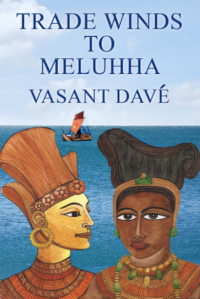
The book concerns the adventures of a young Sumerian called Samasin along the trade routes between the cities of Sumer and the Indus Valley. It’s more than mere geographical exploration, however. Samasin is a young man and his journey includes the finding of friends, enemies and love.
It is a novel packed with character, incident and a complex plot. Many of the characters are engaging and entertaining but I felt that some characters were not fully realised and were there merely to advance the plot. Most, however, are full of life and well described.
The author did an immense amount of research for the book and has created a lively insight into these distant times. He gives a fascinating account of his research as an appendix, together with a useful glossary,
The first part of the book seemed more assured than the middle where the writing slowed a little and the language occasionally seemed uncomfortably modern. This was not helped by some of the decisions that the author took regarding names. I suspect he may have done this to make it more accessible to modern readers. However, I feel that abbreviating the beguiling names of two of the major characters to Sam and Ann stretched authenticity as did the repeated use of the terms Captain and Agent. Most of the time the author maintains a good sense of era and it was a shame when he allowed this to slip.
These few quibbles aside, ‘Trade Winds to Meluhha’ is a work which shines with the passion of the author for his subject. The characters are engaging and the story drives to a surprising conclusion. It is a fascinating insight into distant times and well worth the read.
I don’t suppose there have been many times in history when a British reader is able to read a book about two comparatively little known civilisations of four thousand years ago written by a man who lives in India. The internet and e-book revolutions have made this possible.
For me ‘Trade Winds to Meluhha’ is almost a metaphor for this new trade in ideas across the world. Samasin used the trade winds to explore his world and readers can now use these new trade winds to explore ours. I look forward to the trade wind which brings Vasant Davé’s next book blowing my way.
Related articles
Blog Tour – Trade Winds to Meluhha (terraverum.wordpress.com)
Ancient people were not static (blogs.discovermagazine.com)


October 24, 2013
Queen Jane is Dead. #HistNov
It was on the 24th October that Henry VIII’s third queen, Jane Seymour died having just given him the male heir he was so desperate for. Here is an extract from my work in progress showing how Alice Petherton hears the news.

c. 1536-1537 (Photo credit: Wikipedia)
Twelve days after she gave birth the Queen gave up the ghost. That’s what Susan Dunster said at any rate. Cruel, I know, but witty. Susan never had much time for the Jane Seymour.
It was not news for anybody in the Court if truth be told. Jane had never recovered from the rigours of childbirth. Her strength of body, unlike that of her ambition, had never been noteworthy.
But at the time the Court was more than usually a hotbed of rumour and gossip.
The night the prince was born, rumour had it that the child had only come into the world after the Queen’s legs had been stretched so wide her hips were almost dislocated. Nobody could say whether or no this was true. There had been no midwife in her chamber for the Royal physicians had attended her. These venerable old men were learned in the words of ancient doctors, herbs and astrology. But not one of them had ever before helped a woman give birth. They probably had many Latin and Greek authorities to support the racking of limbs.
Darker rumours whispered that the Queen had been cut open while still alive and relatively hale. That she had lingered on her bed, in agony, her life ebbing from her, screaming curses on the King for valuing an heir more than his queen’s life.
I doubted Jane would ever have cursed in such a fashion. Her motto had always been, ‘Bound to obey and serve.’ She was, despite her fierce ambition, a simpleton, and I thought she would hold to her motto even to her death.
Others said that Jane was very much alive days after the birth of the child. She was said to be strong enough to see the boy immediately after his Christening when he was three days old. However, her weak constitution meant that she was not allowed to leave her chamber. Her non-appearance served only to fuel the more lurid rumours.
At any rate, a week after the Christening, whether from the rigours of natural childbirth, dislocated hips or the cut from the surgeon’s knife, the Queen had died.
I received the news with a horror which surprised me.
Jane and I had been friends when I first came to Court, two Maids of Honour to the newly crowned Anne Boleyn. I may have grown to dislike her but there was still that early tie between us. I prayed that her death had been the first one rumoured, a natural one of gentle sleep and drifting to her end, her mind made easy at having given birth to the King’s heir.
I feared that it might the second. That the King had, indeed, valued his dynasty more than his wife and had ordered that the child be ripped from her belly. That the gash had never healed and the life had been bled from her as if she were a traitor to the Crown, tortured and left to die a lingering and agonising death. Yet, all the while she had continued to send her love to her murderer, rejoicing in her self-sacrifice.
I pressed my forehead to the window to cool it. Rumours spread faster than the plague. Any of them might be true, none of them might. Child birth was a chancy thing at the best of times. It was even more so when the mother was nearing thirty.
I stared out of the window. Whichever of the rumours was true there was one thing for certain now. Henry was a widower once again. Three Queens gone. All lying in their cold, cold graves.
A cold chill clutched my stomach at the thought.
Related articles
Alice Petherton #SampleSunday #HistNov (martinlakewriting.wordpress.com)



